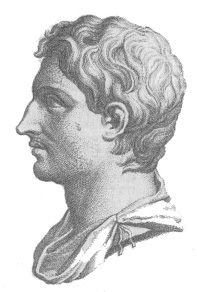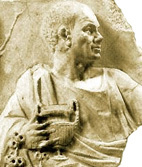Horace
(65 - 8)

Horace — the most quoted of all the Roman writers.
SRI AUROBINDO
Carmina
I.9
Vides ut alta stet nive candidum
Soracte nec iam sustineant onus
silvae laborantes geluque
flumina constiterint acuto?
Dissolve frigus ligna super foco
large reponens atque benignius
deprome quadrimum Sabina,
o Thaliarche, merum diota.
Permitte divis cetera, qui simul
stravere ventos aequore fervido
deproeliantis, nec cupressi
nec veteres agitantur orni.
Quid sit futurum cras, fuge quaerere, et
quem Fors dierum cumque dabit, lucro
adpone, nec dulcis amores
sperne puer neque tu choreas,
donec virenti canities abest
morosa. Nunc et Campus et areae
lenesque sub noctem susurri
composita repetantur hora,
nunc et latentis proditor intumo
gratus puellae risus ad angulo
pignusque dereptum lacertis
aut digito male pertinaci.
Sri Aurobindo’s remarks:
«Horace knew everything there was to be known about philosophy at that time and had indeed all the culture of the age at his fingers’ ends and carefully put in its place in his brain also — but he did not make the mistake of writing a philosophical treatise in verse. A man of great hurbanity, a perfectly balanced mind, a vital man with a strong sociability, faithful and ardent in friendship, a bon vivant fond of good food and good wine, a lover of women but not ardently passionate like Catullus, an Epicurean who took life gladly but not superficially — this was his character. As a poet he was the second among the great Augustan poets, a great master of phrase — the most quoted of all the Roman writers, — a dexterous metrist who fixed the chief lyric Greek metres in Latin in their definitive form, with a style and rhythm in which strength and grace were singularly united, a writer also of satire and familiar epistolary verse as well as a master of the ode and the lyric — that sums up his work.»
Carmina
I.11
Tu ne quaesieris, scire nefas, quem mihi, quem tibi
finem di diderint, Leuconoe, nec Babylonios
temptaris numeros. Ut melius, quidquid erit, pati.
Seu pluris hiemes seu tribuit Iuppiter ultimam,
quae nunc oppositis debilitat pumicibus mare
Tyrrhenum: sapias, vina liques, et spatio brevi
spem longam reseces. Dum loquimur, fugerit invida
aetas: carpe diem quam minimum credula postero.

